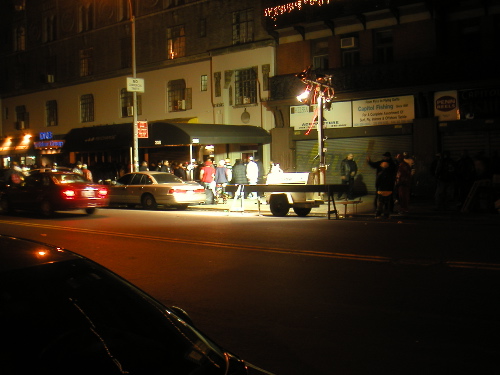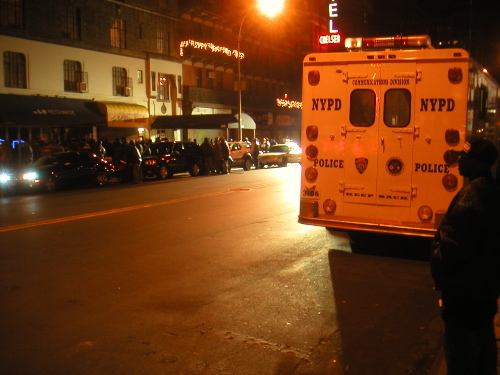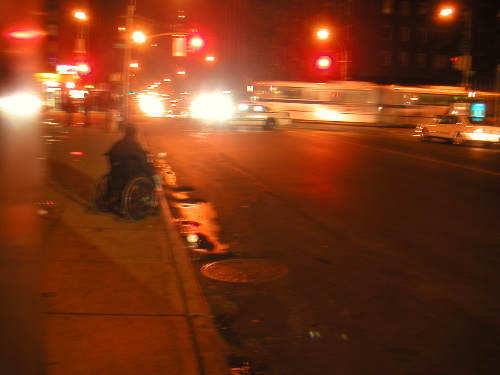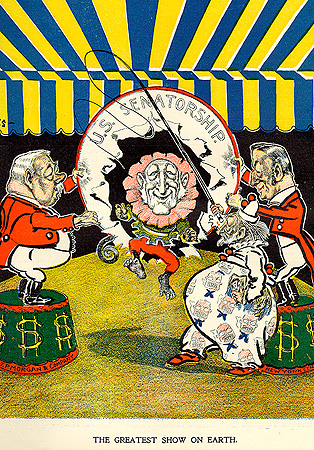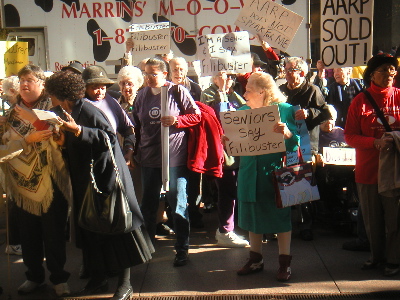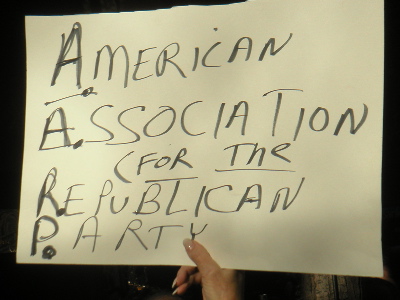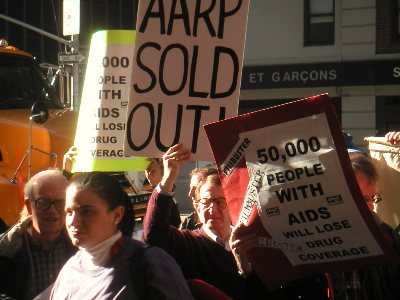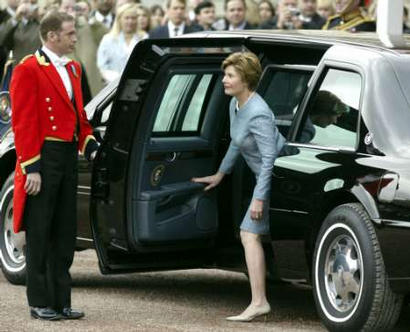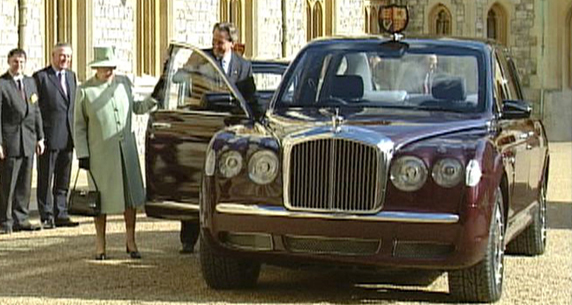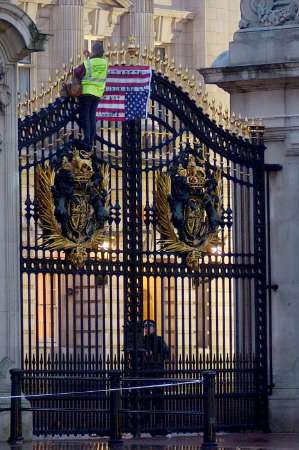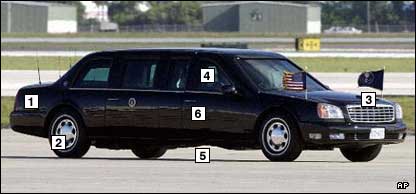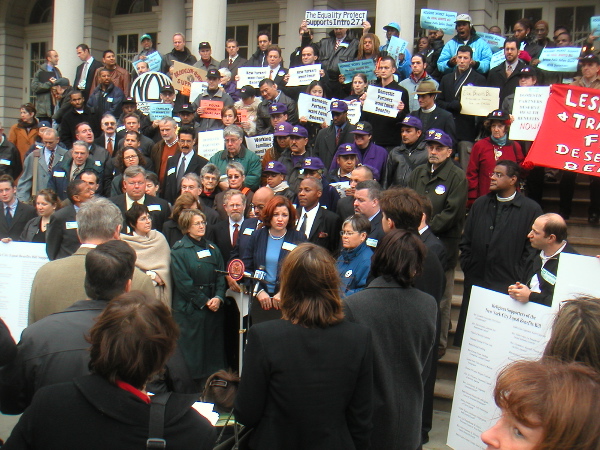
New York City Hall steps, yesterday afternoon
Yesterday afternoon the New York City Council held a hearing on the Equal Benefits Bill, which would require companies that contract with the city to offer domestic partner benefits on the same basis as spousal benefits. The image above is of a press conference organized by the bill's sponsors on the steps of City Hall immediately preceding the session.
Included in the picture are, among others, councilmembers Quinn, Jackson, Lopez, Sears, Perkins, Lopez, O'Donnell and Reed, Public Advocate Gotbaum, State Senator Duane, Assemblymembers Glick and Gottfried, Empire State Pride Executive Director Van Capelle and members of SEIU Local 32BJ, Housing Works people and a pretty diverse assembly of supportive citizens of this city state.
In addition to these faces, those who attended the hearing itself yesterday saw, sitting as supportive members of the Councilmembers Yassky, Clarke, Stewart, Katz, Liu and Gerson. Testifying were some of the figures on the steps earlier as well as Cynthia Goldstein of the San Francisco Human Rights Commisison, Brian McLaughlin of the AFL/CIO, and a number of others.
The most eloquent voices were those of Chris Quinn (as usual), Mararita Lopez, Helen Sears, Alan Van Capelle, Tom Duane, Cynthia Goldstein and Brian McLauglin.
A number of the speakers addressed the fact that the bill was not designed only for same-gender couples, but was intended for any unmarried partners. In New York, over 70% of those who have registered with the city as domestic partners since the office was established a number of years ago are male-female couples.
Some 37 or 38 council members have already signed on as supporters of the bill, INTRO. NO. 271, making it virtually veto-proof, a reference I have to insert here because in fact Mayor Bloomberg is perversely opposed to it at this time.
Two lawyers for his administration who spoke at the hearing were entirely unable to defend his opposition, and ended up making themselves more subjects of pity than of anger or frustration. In fact Council members asked that the administration bring the "Laws Department" next time if it really wanted to offer testimony. I have never seen lawyers act and speak with such lack of assurance and incompetence. I suspect that they had found themselves unable to defend professionally what they must personally abhor. Let's hope the Mayor does the same in the end.
In the end the lawyers, led by Terri Matthews who read a statement, had seemed to be defending the bigotry of the Catholic Church, or at least the importance of not discomfiting that bigotry, since they considered its contractural business operations so important to the city.
Lopez argued both outside City Hall and inside the hearing room that if faith-based paid city vendors have attitudes and policies that are antithetical to the welfare of the city they plainly should not be given the taxpayers' money. More fundamentally, she insisted, when a religious institution balks at conforming to city law and policy because of its religious principles, both it and the city have a problem even more major than the issue of benefits owed to an employee's partner or dependents. Lopez asserted that faith-based organizations may have a fundamental difficulty in providing the health care New York needs. If as a vendor the organization cannot at the very least separate its faith from the services for which it is contracted by the city it has no business being a New York City vendor at all, she concluded. Indeed, New Yorkers are not supposed to be subsidizing religious organizations in the conduct of their religious teachings and activities.
When asked by a reporter on the steps outside the hearing, the Reverend Harvey of the New York Episcopal Diocese replied that, yes, his own church had been providing domestic partner benefits for at least several years. It seems that the Roman Catholic Diocese is a utility in neither sense, that of monopoly or that of benefit.
Queens Council Member Helen Sears contested the argument that Matthews had repeated a number of times, that "social policy" should not be made through the procurement process, and disagreed with her colleague Lopez's insistence on the priority of the economic utility of the bill being discussed over its social utility. Sears insisted proudly and emphatically that the New York City Council is interested in social justice, even if denying it also has economically burdened, and would continue to directly burden, the health services of the city, because the consequence is that people are going without medical insurance.
It's not about marriage, Duane reminded the room when he observed that when a company gives a health care benefit to its employees for their married partners, it is not giving it because the employees are married, but because they are employees. In fact, of course, for many employers right now family health benefits are functionally a reward for marriage. Duane also pointed out that New York has always used its purchasing policies to pursue social justice, as seen in the ways it addressed Northern Ireland and South African issues. Finally, he was not subtle in telling the mayor that he should do the right thing at a time when same-sex couples are being threatened everywhere in this country by "people of his persuasion". He emphasized that he meant Republicans.
The big Irish guy in a suit who representated the AFL/CIO spoke of partnerships and loving human relationships, and the importance of recognizing and supporting them, when he referred to the more than 700 union members who died September 11. "Each of them had someone who loved them."
Goldstein assured the Council that San Francisco's experience has shown that a domestic partner bill like the one being offered now in New York was a win-win proposition. There simply was no downside, she argued, especially since her city had already done all the hard work in its breakthrough effort.
Van Capelle was just really good all around. A hardworking associate in the development of the bill, a loud cheerleader on the steps, an articulate spokesman inside and out, and, if you were watching yesterday, obviously a caring mentor and partner with other activists. He's also beautiful.
Councilmember Stewart thought that the bill was too narrowly drawn, that it should not be restricted to partners defined by sexual relationships, and while others in the room were certainly not unsympathetic, it's a battle which will probably have to wait for another day. The best victory would be a single-payer national healthcare system, but this is Bush's America, even if it's still our New York.
Pollyannna time. I was very impressed with the councilmembers who serve New York these days, or at least those who were visible yesterday afternoon. Barry suggests that our local politicians may be among the very few elected officials in the entire country who can still say what they really want to say - and be elected, even reelected. Maybe New York really does have to get out of the U.S. The only alternative for many of us, and it's perhaps more and more inescapable, may be emigration.
Meanwhile, back on earth, near the end of one of his statements, Stewart asked what he probably thought was a rhetorical question. Why did it take so long to get this bill going? A mumbled answer came from a couple seats to my left. "Giuliani." It was the wonderful Andy Humm, muttering under his breath while he scribbled his notes. I would like to add another answer, "Vallone". Good riddance to them both.
Bloomberg has to be next.
Chris Quinn for mayor!
